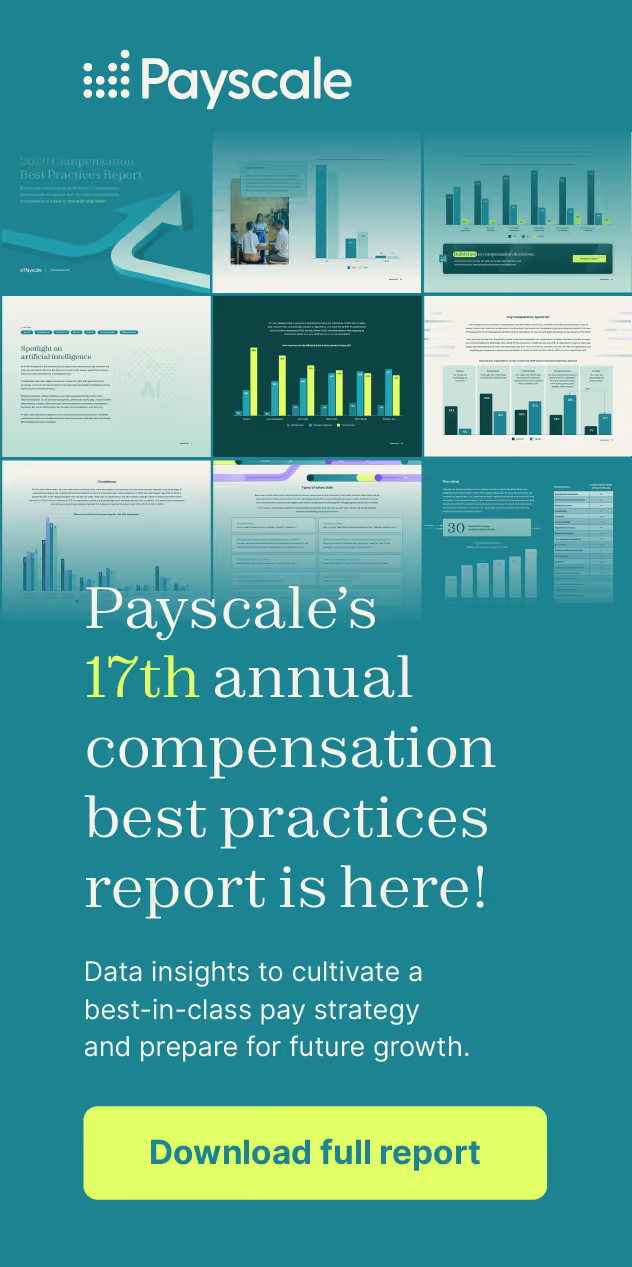Non-Monetary Compensation and the Essentials of Developing a Total Compensation Policy
They say cash is king, but in today’s economy employees know that there is more to the story than cash alone. Today’s job seekers and your employees have become more savvy about non-monetary compensation. And there is a good reason they are paying attention to it.Good health insurance and a generous retirement plan benefits are becoming more and more elusive. Employers who offer these non-cash rewards stand out among their peers.
The Value of Non-Monetary Compensation
Having real-time, accurate, market salary data sets your apart as an employer. You pay a fair wage and stay in budget. Try a demo of PayScale MarketRate and see the benefits of access to salary data on over 7,000 different job titles.
Non-monetary compensation can equal 20-60% of the value of the cash compensation that an employee receives. For the current job seeker, starting salaries have barely increased, frozen or actually dropped. So, finding non-monetary benefits in an offer can be essential when an employee evaluates it. These added perks can sweeten (and seal) the deal.
Types of Non-Monetary Compensation
Non-monetary compensation can include many different elements – from free coffee to a company picnic or discounted parking. Most frequently, though, it refers to the value of more traditional benefits. These benefits can include the mandatory benefits such as Social Security and Medicare, unemployment and worker’s compensation. These are the items that 95% of employers in the United States must provide. However, it also can include the voluntary benefits such as health, dental and vision insurance. And, it usually includes some type of retirement plan, as well.One reason employees place a high value on the non-cash compensation parts of a total compensation package is because they can greatly reduce household expenses. For example, getting an employer’s help with health insurance premiums can save a family many hundreds of dollars a month, not to mention savings from the better medical coverage likely provided by a group plan.Beyond the employee getting material value from their benefits, there are non-material perks, as well. Companies who offer benefits, such as a rich retirement plan, send a message that they value their employees and want to promote long-term relationships with their employees. These employers are becoming more and more sought after. Workers are looking for those organizations that invest in their employees and want to provide a fair wage, and a fair benefits package. Savvy workers will wait to work for a company that offers a total compensation package rather than work for a one that provides high pay with little in the way of benefits.
The Benefits of a Non-Monetary Compensation Plan for Employers
As an employer, there are many different reasons to look at increasing the value of the non-monetary elements of your total compensation package. First, more employees are asking companies to provide good benefits. Second, the government offers companies many tax incentives for certain types of benefits offered to employees. For example, when employers offer tax-deferred benefits, such as retirement accounts or Section 125 flexible benefit plans, the employees and the employers save taxes on the amount that the employee defers. Often times the tax savings to the organization can offset or greatly reduce the cost of administering the plan.Finally, offering benefits can help to increase retention among your employees. When you give employees more cash per paycheck the reward is immediate but short-lived. When you give employees a match in their retirement plan with a vesting schedule which only gives employees the full value of that contribution after a few years, you increase the likelihood that employees will stay with you. This investment can mean savings for you, as an employer, because of lower employee turnover and a more experienced, committed workforce.
Non-Monetary Compensation Attracts Top Talent
Taking this one step further, many top performers are looking for an organization that goes even further than just cash compensation and basic benefits. They’re looking for flexible work schedule, employee training or education benefits, and well-trained managers to work for. These elements are often even more important than the traditional “what do I get when I work for you” benefits. The value of a well-trained manager who has an excellent reputation for helping individuals reach their full potential and increase their likelihood for promotion can be invaluable to employees. Often employees will stay with an organization or take less money to work for the right people at the right place.If you’re looking to stay at the top of your industry by nabbing top talent, it’s important to think about non-monetary compensation in the context of what you offer to your employees in all areas of their career and quality of life. In these tough economic times - where it’s hard to give more money or richer benefits – you can win the war for talent by playing up the strengths that you have as an organization or figuring out what you can offer that will be unique and valued in the market.
Consider All of Your Non-Monetary Compensation Options
There are a host of benefits that companies can offer to attract and retain top talent. Here is a list of a few for you to consider.
- Flex-time schedules
- On-site childcare
- Free or discounted parking
- Free or discounted food and drinks
- Gym membership discounts
- In-office massage or yoga
- Casual Fridays
- Mentoring programs for career advancement
- Free or discounted educational and training opportunities
- Work opportunities in multiple locations
- Cross-training in other areas of the business
- Annual or quarterly company parties
Regards,Stacey CarrollDirector of Customer Service and Education, PayScale, Inc.Do you have a topic you would like Compensation Today to cover? Write us at comptoday@payscale.com.Areyou paying your best employees enough to retain them after the economypicks back up? Get up-to-date and make sure your external salary marketdata is specific enough to the education, skills set and experience ofemployees you want to keep. Give a PayScale Demo a try.
- Get accurate compensation data with a free PayScale Compensation Report.
- Learn how performing Compensation Research will save your company time and money.
- Learn how to set competitive salary ranges with a free Guide to Salary Benchmarking.
Find related Articles:





